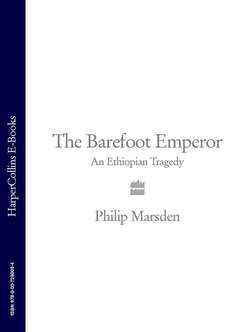Читать книгу The Barefoot Emperor: An Ethiopian Tragedy - Philip Marsden - Страница 23
Оглавление11
When Cyril left for the lowlands, Tewodros sent him off with personal gifts of ivory and, for Said Pasha, ‘three excellent and four average horses’, as well as some spears and a dagger. He also enclosed two letters in his saddlebags – one to the pasha, the other to Queen Victoria. It was his first foray into foreign relations.
Within eleven days the letter to Said Pasha passed from Amharic to Arabic. Its date changed from the Ethiopian 5 Hidar 1850 (13 November 1857 in the Gregorian calendar) to the Hejira 25 Rabi’ al-Awwal. The address was buffed up from the plain Amharic of Tewodros – ‘my friend Sa’id Pasha, the ruler of Egypt’– to the Arabic: ‘to His Highness, the most noble, the magnificent pleasure, and the true lover of God, Muhammad Sa’id Pasha, Protector of the Land of Egypt. May he continue to be preserved through the care of the Lord of Creation.’
The text itself reflected the turnaround in Tewodros’s attitude to Egypt. Glossing over his own furious imprisonment of Cyril, he wrote: ‘When I was told by my father the patriarch that you love me and want my friendship, I was very happy … May God increase our friendship.’
The letter to Queen Victoria was unembellished, and more neutral. He probably wouldn’t have sent it at all had Plowden not encouraged it. The consul was keen to preserve his own ambitions in the light of Tewodros’s new friendship with Cyril and Egypt:
May this letter sent by the King of Kings Tewodros of Ethiopia reach the queen of England, Biktorya. How are you? Are you well? I am well, thank God … I have received your envoy Buladin [Plowden] with love and friendship. It is because I have not found rest and [matters] have not settled down for me that I have not written until now. Now, you are the child of Christ and I am the child of Christ. For the love of Christ, I want friendship …
It was Plowden who was now isolated. He accompanied Tewodros’s letter to the queen with an explanatory one of his own. He stressed how finely balanced not only Tewodros’s interest in the British was, but also his entire rule. It was imperative to offer material support to Tewodros. Plowden was aware that only a year earlier the Egyptians had granted a licence to the French to build a canal at Suez. Now the French were trying to wrest Ethiopia from Tewodros: ‘The French and the Roman Catholic mission have already spent large sums to enable, if possible, his adversary Dejazmach Niguse to rival him and three cannon are now at Massawa for that purpose.’
To help save the Red Sea from French control, Plowden suggested to the Foreign Office that they send Tewodros a few hundred muskets and percussion caps – also a ‘handsome piece’ for the emperor’s own use.
In London Plowden’s long letter received a scribbled, single-word minute from Lord Clarendon: Approve. C.
The first reply to the two letters came from Egypt. An ambassador from Said Pasha arrived in Ethiopia with a long train of mules behind him, heavy with gifts for Tewodros – one hundred double-barrelled guns, numerous tents and silks and bolts of cloth – and four large cannon.
Meanwhile, from Lord Clarendon’s desk, Plowden’s plea for arms snailed its way to the War Office. A year passed. The War Office amended Plowden’s order, and a docket was filled out by a Mr Moore at the Tower:
Rifle with rammer and implements……………………………..1
Cone and screw-driver for Deane’s revolver………………..1
Case………………………………………………………………………………1
That was all. The War Office considered it ‘inappropriate’ to send arms to Tewodros at that moment. On 5 October 1859 – two years after the letters had left Ethiopia – Plowden at last received news of the request from his agent on the coast: ‘The rifle has been received, but no ammunition.’
Plowden’s position had become precarious. Four and a half years previously he had come up to the highlands on a brief visit to the new ruler. As British consul he was not only friendless now but surrounded by murmurs of hostility. The Ethiopians had reverted to their old suspicion of European Christians, and his way out of the country was blocked by the rebel Niguse. Walter Plowden was trapped.
